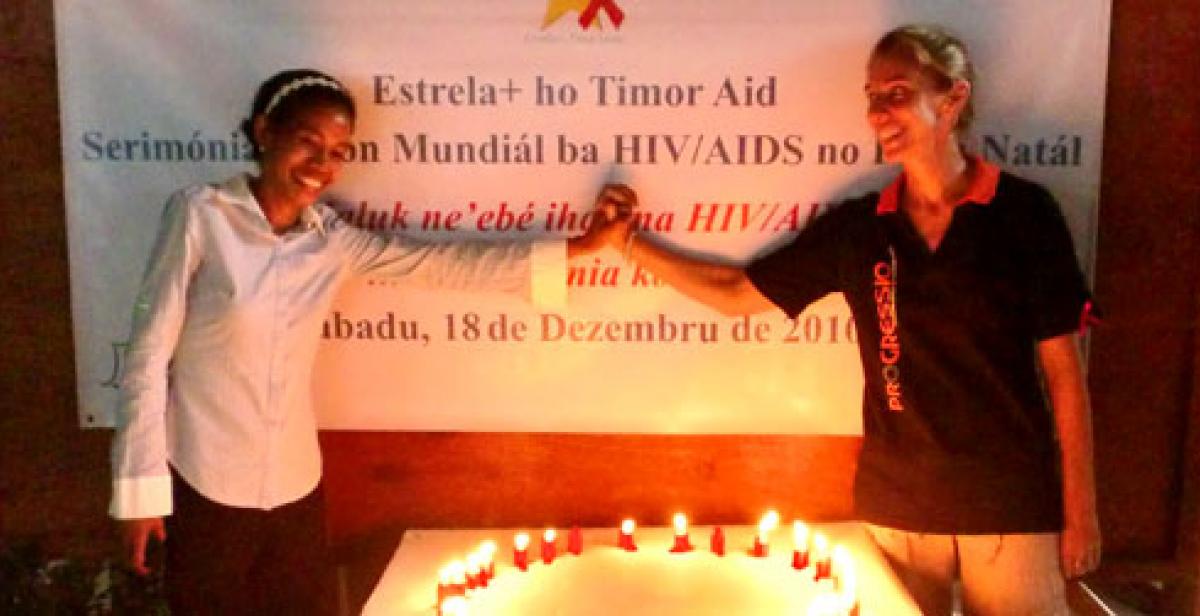Fi Oakes (pictured above right) has just finished two years in Timor-Leste as a Progressio development worker – working alongside people living with HIV with two partner organisations, Estrela+ and Fundasaun Timor Hari’i.
On a brief trip back to the UK, we asked Fi: What were the highlights? What does she think she achieved? Find out here…
You said you applied to be a Progressio development worker because you liked our philosophy of ‘working through empowerment’. What does that mean to you?
In the development field, there’s a lot of talk about beneficiaries. To me that’s patronising. My approach was to identify what my co-workers felt comfortable with and arrange the work to suit them. It suits me to be able to work with creativity – not to be constrained by a rigid brief but to be able to bring my knowledge, experience and relationship-building skills to achieve the aims.
Ines [Lopez, the Director of Estrela+] used to say capacity-building is not training and workshops, it’s being there, helping, coaching and mentoring on a day-to-day basis.
Can you give us an example of ‘working through empowerment’?
Estrela+ is a group set up by people living with HIV. The members live in different parts of the city and different districts. So they had a lot of challenges in communicating with each other and coordinating their work.
First of all we wanted to get them together to do a capacity assessment [work out their strengths and weaknesses, and what could be improved]. I spoke to them all individually and they said ‘yes, yes, we will come’. I didn’t realise they were just saying this because they didn’t want to be difficult... Only one person came to the meeting!
So what did you do next?
I found out there was a protocol to follow – if you wanted someone to come to a meeting during the week, you had to send a written invitation to their manager. The trouble with that was the manager might say, “That looks interesting – maybe I’ll go instead.” But I didn’t want the manager to come, I wanted the positive people – and I couldn’t ask just for HIV-positive people to come, because that might expose them at their work. So I used some of the money in the DW [Progressio development worker] project budget to organise the meetings for lunchtime on a Saturday so they could all come.
At the meetings, I asked them to identify what needed to be achieved, nominate people to take a lead on particular issues – consulting at the meeting, assigning tasks to each other and reporting back at the next meeting. In this way the group began to become more solid and to move forward in its aims. Previously they had been discussing their ideas but not able to action them. The DW activities budget empowered the group to find a way to meet and move their agenda forward.
How would you sum up your achievements?
There were a lot of challenges with Estrela+, and I think my biggest achievement was to help pull them together and build their profile as a group. They moved from being a disparate bunch of people to being the main point of contact on any issue to do with living with HIV. The Ministry of Health now routinely invites them to deliver a module on ‘living with HIV and stigma and discrimination’ during training of counsellors, and the World Health Organisation and UN bodies invite them to meetings.
The members also identified that there was a need for ‘Care and Support’ as well as ‘Advocacy’. Estrela+ continued their work on advocacy and some members formed another group called Esperanca and began to work with the Catholic Church and the Ministry of Social and Solidarity to support people living with HIV. The two groups now hold regular joint briefing meetings and refer clients to each other. So for example, if a client has lost their job due to their HIV status, Esperanca will support them with food and home visits, whilst Estrela+ will address the issues of stigma and discrimination in the work place with the Unions and through the Timor-Leste Labour Code and with community sessions on HIV awareness.
Is there one story that sums up what you feel you achieved?
I was really pleased toward the end of the placement to find that the Executive Director of Estrela+ was taking more of a lead and less and less asking me what she should do. For example she was responding to emails from the Ministry of Health and giving her candid opinion on the style of leaflets that should be produced in the local context to attract women into the Prevention of Mother to Child Transmission Programme.
I am also delighted that Estrela+ has achieved the status of sub-sub recipient of the Global Fund for TB, AIDS and Malaria, meaning they can receive funding through my other partner organisation FTH (which is an established sub-recipient), to continue to build on their advocacy work. This partnership would not have been possible two years ago as the group was not ready to take this level of leadership.
Photo: Fi Oakes with Ines Lopez on World AIDS Day, December 2010.



